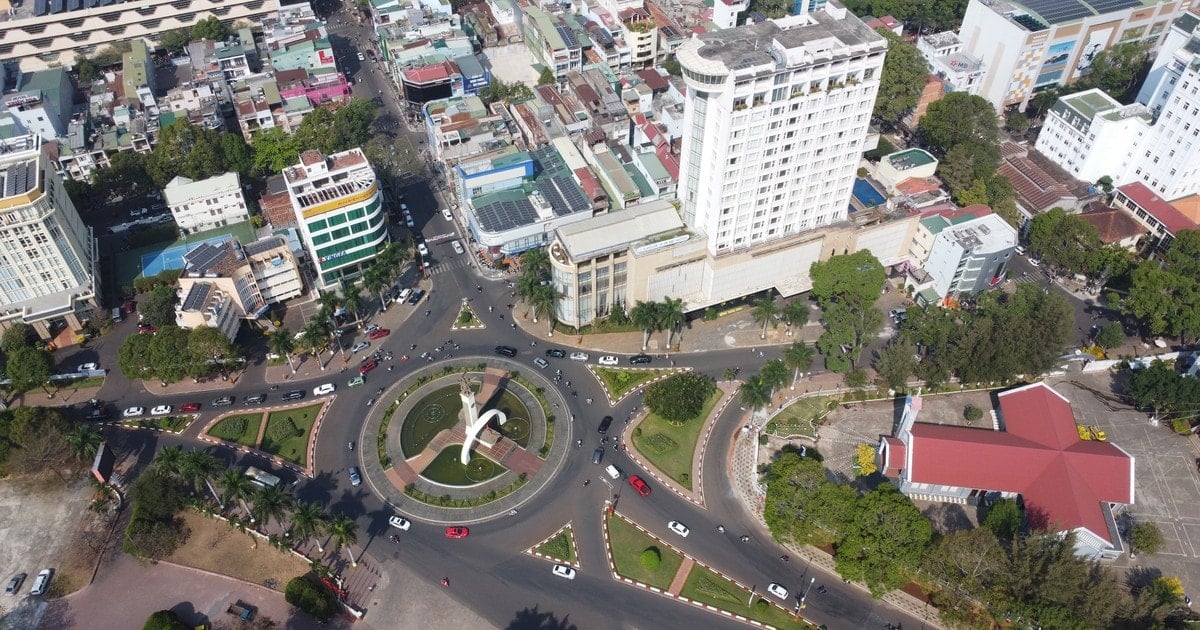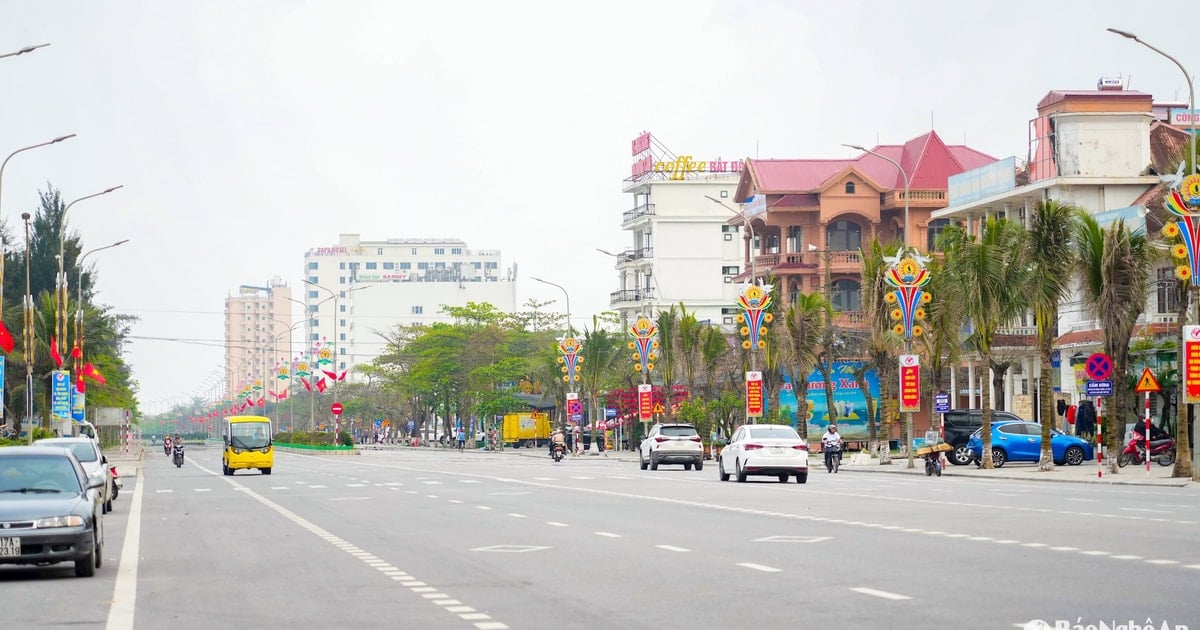Reporting on the results of national digital transformation in 2023, Deputy Minister of Information and Communications Nguyen Huy Dung said: The World Intellectual Property Organization ranked Vietnam's Innovation Index in 2023 at 46th place, up 2 places compared to 2022, continuously maintaining in the top 50 countries from 2018 to present.
In 2022 - 2023, according to the e-Connomy SEA Annual Economic Report published by Google, Temasek, Bain & Company, Vietnam is the country with the fastest digital economic growth rate in Southeast Asia and is forecast to continue to hold this position until 2025. The digital economic growth rate in each industry and field of Vietnam compared to 2022 achieved impressive results: online tourism increased by 82%, digital payments increased by 19%, making our country the fastest growing country in digital payments in Southeast Asia, e-commerce increased by 11%...
Deputy Minister of Information and Communications Nguyen Huy Dung speaks. Photo: Duong Giang/VNA
Results of administrative procedure reform and online public service provision show that: Administrative procedure reform and improvement of the investment and business environment have been promoted. By the end of 2023, ministries and branches had cut and simplified nearly 2,500 business regulations in 201 legal documents; publicized more than 15,700 business regulations on the Business Regulation Consultation and Lookup Portal. Ministries and branches have cut and simplified 528/1,086 administrative procedures (about 49%) to implement 19 Resolutions of the Government on simplifying administrative procedures and citizen papers related to population management...
Encourage businesses to invest and develop digital infrastructure
Regarding the implementation of the National Digital Data Year, according to Deputy Minister Nguyen Huy Dung, state agencies have put into operation and exploited 7 national databases. The rate of ministries and provinces that have identified a list of databases reached 64%. The number of specialized databases established in ministries, branches and localities increased by 38.5% compared to 2022, from 1,280 to 2,087 databases.
The announcement of the plan and the open data catalog increased sharply from 9% to 52% compared to 2022. However, there is still no specific set of criteria to evaluate the level of data development of state agencies. The Ministry of Information and Communications will update, supplement the assessment and ranking of the level of data development of state agencies in the national digital transformation index.
In the 2021 - 2023 period, the Ministry of Information and Communications will coordinate with telecommunications enterprises to provide mobile coverage in 2,433/2,853 signal-delayed areas. As of December 2023, the country has 620 signal-delayed villages; of which 502 are in extremely disadvantaged areas, 118 are not in extremely disadvantaged areas, including villages that still do not have electricity. Vietnam's network speed in 2023 will increase by 15 - 30% compared to 2022.
Vietnam has 13 data center service providers, 45 data centers with a total of nearly 28,000 racks (used to place servers and network equipment). In 2023, there will be 2 more large-scale data centers of VNPT and CMC. 2023 is also the year to launch the National Data Center Project. It is expected that each year, Vietnam will need an additional 10,000 - 12,000 racks. Therefore, the Ministry of Information and Communications believes that Vietnam needs to issue a national digital infrastructure plan, encouraging businesses to invest and develop digital infrastructure that meets international, green and sustainable standards.
Vietnam currently has 1.5 million workers working in the field of information technology and digital technology. Our country also has 168 universities and 520 vocational schools training in ICT. Every year, over 84,000 students graduate from universities, colleges and intermediate schools; the total enrollment target is about 100,000. According to forecasts in Vietnam, some job positions have increasingly high recruitment needs that the market has not met, such as: Data Engineer, Artificial Intelligence, Cloud Computing.
The national digital transformation program and strategy have identified the deployment of digital platforms as a solution to accelerate national digital transformation. The Ministry of Information and Communications has issued a program to develop and promote the use of national digital platforms, including 38 platforms (8 for digital government; 12 for digital economy; 11 for digital society, 7 multi-purpose platforms). Each digital platform is chaired by a ministry or sector. To date, 8 national digital platforms have been evaluated and announced, with a total number of regular users of about 150 million users/month.
Creating momentum for digital economic development
2,074/3,192 systems, 65% of which have been approved for safety levels. The Ministry of Information and Communications has established a platform to support management of information system security assurance at levels to help ministries, branches and localities implement this work, allowing for automatic monitoring and measurement. The Ministry recommends that ministries, branches and localities effectively use the platform and complete the approval of information system levels under their management in the second quarter of 2024.
The network trust label is an important guide to help service users identify trustworthy services and limit the risk of fraud. Currently, 4,770 websites have been evaluated and assigned a network trust label by the Ministry of Information and Communications; including 3,823 websites of state agencies. Together with the National Malicious Domain Name Warning and Prevention System, to date, functional units have blocked 9,073 websites that violate the law, including 2,603 fraudulent websites; protecting more than 10.1 million people from accessing violating and fraudulent websites in cyberspace. The Ministry also requested ministries, branches and localities to assign network trust labels to 100% of websites under their management by the second quarter of 2024 at the latest.
According to the report of the Ministry of Information and Communications, by the end of 2023, 81% of administrative procedures had been deployed as online public services, of which 48.5% of administrative procedures were deployed as full-process online public services. In terms of efficiency, the ratio of online submissions to the total number of administrative procedure settlements reached 38.3%. It is estimated that nearly 37 million working hours of people have been saved compared to performing public services in the traditional way, equivalent to a savings of VND 1,274 billion.
Vietnam's digital economy continues to grow rapidly at a rate of about 20%, three times faster than GDP growth. However, this growth rate is forecast to slow down in the next few years. The Ministry of Information and Communications has identified the digital economy as a new space with potential for the proportion of the digital economy to reach 20% by 2025 and 30% by 2030. Vietnam has 5 potential industries and sectors including: Agriculture, tourism, textiles, logistics, processing and manufacturing industry...
Deputy Minister Nguyen Huy Dung clearly stated the key orientation for 2024: Vietnam needs to find new space and new development momentum for economic growth and labor productivity. The Ministry of Information and Communications proposed to the National Committee the theme to orient the key tasks for 2024 as "Universalizing digital infrastructure and creating digital applications to develop the digital economy - New driving force for economic growth and labor productivity". The list of key tasks for 2024 includes 9 tasks of universalizing digital infrastructure, 5 tasks of universalizing fundamental elements for the digital economy, 6 major problems of digital application creation that Vietnamese telecommunications and digital technology enterprises focus on solving.
According to VNA/Tin Tuc Newspaper
Source








![[Photo] Closing of the 11th Conference of the 13th Central Committee of the Communist Party of Vietnam](https://vstatic.vietnam.vn/vietnam/resource/IMAGE/2025/4/12/114b57fe6e9b4814a5ddfacf6dfe5b7f)




























![[Photo] Overcoming all difficulties, speeding up construction progress of Hoa Binh Hydropower Plant Expansion Project](https://vstatic.vietnam.vn/vietnam/resource/IMAGE/2025/4/12/bff04b551e98484c84d74c8faa3526e0)




























































Comment (0)